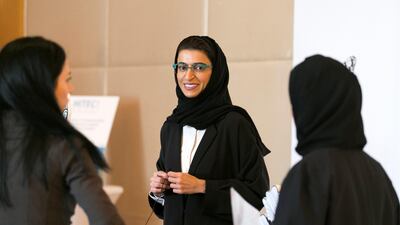Noura Al Kaabi, Minister of Culture and Knowledge Development, has called for private sector companies to offer women better maternity leave and flexible working hours to ensure they stay in the workforce.
"Companies should look into more flexible policies," Ms Al Kaabi told The National, on the sidelines of the 19th edition of the Naseba Global WIL Economic Forum, on Wednesday.
She cited the example of Abu Dhabi’s Media Free zone Authority and twofour54, where she is chairwoman of both, which gives women up to six months of maternity leave including two months of paid leave, two months with half pay and two months unpaid.
“The most important thing is how each entity can be flexible in promoting that and giving women the choice of having a long or short maternity leave and having women come back where they are refreshed and ready to work,” she said.
In her keynote address to delegates attending the two-day event, Ms Al Kaabi said the question of whether to empower women to progress is no longer a matter of debate, “it is simply the right thing to do socially and economically, it is the norm”.
“Women’s participation in the economy not only boosts development, it diversifies national economies and opens a nation up to new ideas and approaches,” she added.
With maternity leave and flexible working practices key to ensuring women stay in the labour market, Ms Al Kaabi said that while the government’s maternity policy has been extended and is a regular discussion point at the Federal National Council, there is “more to be done on how we can encourage other entities to aspire to be more flexible when it comes to women and maternity”.

In April, Dubai Government raised the paid maternity leave to three months for its employees, with staff allowed to add annual and unpaid leave to maternity leave to extend it up to 120 days.
It followed Abu Dhabi's announcement in September of 2016 of three months of maternity leave for government employees, with three days of paternity leave for new fathers. Ras Al Khaimah made a similar announcement in November.
The new rules, however, have widened the gap between the public and private sectors, in which female employees are entitled to only 45 days of maternity leave and struggle to balance their careers and families.
Ms Al Kaabi said the challenges of maternity leave and work-life balance “are things that tend to affect women disproportionately due to traditional gender roles.”
As women step up in the workplace, she said men will have to support women in other ways.
While she lauded new laws to increase paternity leave in government sectors, she called on companies to offer good maternity and paternity policies.
“Property maternity leave is important for women to be able to continue working. I am happy to see a number of UAE entities putting nurseries in place at work, for example, and offering flexible work schedules for men and women with families,” she said.
_______
Read more:
Three-months maternity leave for Dubai Government employees
Office breastfeeding stations a big breakthrough for UAE’s working mums
_______
Corporates at the event said their maternity and flexible working policies are decided on a case-by-case basis.
Harald Wolf, general manager of Roche Diagnostics Middle East, which has 450 employees across the region, says the company’s core hours at its regional headquarters in Dubai are nine to five but it also allows women to work from home, though this is not an official policy.
“We have not implemented home offices, so it depends on each individual,” he said, adding that the UAE office has increased the percentage of women in leadership positions to 35 per cent this year from 25 per cent in 2016.
The company’s maternity policy in the UAE is six months.
“We always look at the Labour Law and it is very different from country to country. I am from Germany and they have one of the most generous policies in the world,” Mr Wolf said.
Visa, meanwhile, is currently reevaluating its maternity and paternity policies in the UAE after they were recently enhanced in the United States. It currently offers UAE female employees 45 days full pay and 100 working days at half pay. Male employees are entitled to a five-day paternity leave.
Gregory Sottolano, vice president of human resources, central and eastern Europe, Middle East and Africa, said women returning to work from maternity leave can discuss options with their managers, which include flexible working options.
“We’ve had a woman just return to us after a year of maternity leave, now working an intensive four-day work week with one day off and remote working for some of that time,” he said, adding that Visa also recently introduced a returnship programme to encourage mothers outside the company to rejoin the workforce.
Sophie Le Ray, chief executive of Naseba, a business facilitation services company, and founder of the Global WIL Economic Forum, said companies that showcase their inclusive maternity and work-life balance policies are proving that is it not only feasible but also impacts the bottom line.
"With women, you give them a task, you don't give them a deadline, and they complete the task. Women don't need to work nine to five," she said. "Employers must understand that a person who is physically there and attached to her desk, sad and worried about her baby at home, is not necessarily going to be productive. It is much better the other way around.
"It does not work for every job, such as sales roles. But if the results are there, why not."


